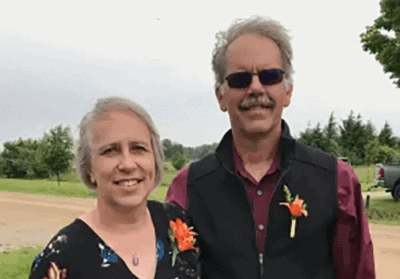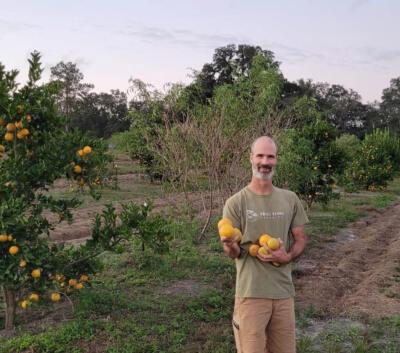TOPP West Resources
Federal funding is available to help agricultural producers transition to an organic system of production. As part of the larger $300 million USDA Organic Transition Initiative, the Natural Resource Conservation Service has begun to make $70 million available to help producers adopt organic management systems in pursuit of certification. The following resources provide information on specific USDA technical assistance and funding support programs available to farmers. We will continue to update this with additional resources, so be sure to check back often.
Field Day Toolkit
A guide to organizing field days for agriculture research dissemination
 Field days provide a unique space for farmers, researchers, and agricultural professionals to come together to share insights, learn from one another, and foster future collaborations. Discover a roadmap and customizable materials to plan, host, and follow up on hosting a successful event at your farm or research site with OFRF’s new Field Day Toolkit. Learn more.
Field days provide a unique space for farmers, researchers, and agricultural professionals to come together to share insights, learn from one another, and foster future collaborations. Discover a roadmap and customizable materials to plan, host, and follow up on hosting a successful event at your farm or research site with OFRF’s new Field Day Toolkit. Learn more.
Utilizing NRCS Support on Organic Farms: Tech Note 12
Tech Note 12 provides a wealth of knowledge needed to effectively support the unique requirements of organic producers
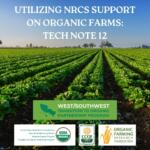 The USDA’s Natural Resources Conservation Service (NRCS) offers funding and technical assistance to help farmers enhance their farming operations, including increasing support for transitioning to organic practices. However, farmers, field agents, and Technical Service Providers (TSPs) may not always be familiar with how NRCS programs can support organic practices. To address this, OFRF collaborated with NRCS to develop a document that equips farmers and field agents with the knowledge needed to effectively support the unique requirements of organic producers. That document is Technical Note 12 (TN-12). Learn more.
The USDA’s Natural Resources Conservation Service (NRCS) offers funding and technical assistance to help farmers enhance their farming operations, including increasing support for transitioning to organic practices. However, farmers, field agents, and Technical Service Providers (TSPs) may not always be familiar with how NRCS programs can support organic practices. To address this, OFRF collaborated with NRCS to develop a document that equips farmers and field agents with the knowledge needed to effectively support the unique requirements of organic producers. That document is Technical Note 12 (TN-12). Learn more.
The Organic Certification Cost Share Program (OCCSP)
Farmers across the U.S. may now receive up to $750 per scope for organic certification costs
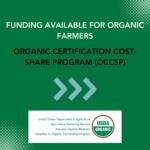 As a farmer or a technical service provider to farms, you understand the importance of organic certification. It not only adds value to your products but also opens doors to a growing market of health-conscious consumers. However, the process of obtaining and maintaining organic certification can be costly. The good news is that financial assistance is available through the Organic Certification Cost Share Program (OCCSP) to help ease this burden. In this blog post, we’ll walk you through the basic steps to access up to $750 in financial assistance for each organic certification scope, covering expenses paid between October 1, 2022, and September 30, 2023. Learn more.
As a farmer or a technical service provider to farms, you understand the importance of organic certification. It not only adds value to your products but also opens doors to a growing market of health-conscious consumers. However, the process of obtaining and maintaining organic certification can be costly. The good news is that financial assistance is available through the Organic Certification Cost Share Program (OCCSP) to help ease this burden. In this blog post, we’ll walk you through the basic steps to access up to $750 in financial assistance for each organic certification scope, covering expenses paid between October 1, 2022, and September 30, 2023. Learn more.
Environmental Quality Incentives Program (EQIP)
Farmers across the U.S. are eligible for significant technical and financial assistance from the Natural Resource Conservation Service (NRCS).
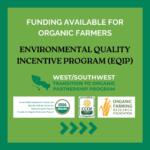 Farmers and technical service providers know first hand that the most significant barriers to developing sustainable infrastructure and production practices are due to time and resource scarcity. NRCS’ EQIP program offers financial assistance and technical support to implement new conservation practices on your farm, with additional support for historically underserved applicants including socially disadvantaged, beginning, veteran, and limited-resource farmers and ranchers. In this blog post, we’ll provide an overview of what EQIP has to offer, and the steps to utilizing this program… Learn more.
Farmers and technical service providers know first hand that the most significant barriers to developing sustainable infrastructure and production practices are due to time and resource scarcity. NRCS’ EQIP program offers financial assistance and technical support to implement new conservation practices on your farm, with additional support for historically underserved applicants including socially disadvantaged, beginning, veteran, and limited-resource farmers and ranchers. In this blog post, we’ll provide an overview of what EQIP has to offer, and the steps to utilizing this program… Learn more.
Organic Transition Initiative (OTI)
$75M in cost-share grant funding is available to certified organic and transitioning-to-organic growers under EQIP to meet NRCS’s Conservation Practice Standard for Organic Management (CPS-823).
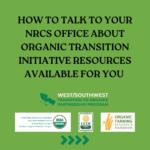 Organic farmers must manage their land without prohibited inputs for 3 years for their products to be certified. This transitioning period can be incredibly challenging as farmers and their land adjust to new production practices. OTI is intended to help producers implement conservation activities required for certification, receive expert technical support, and recover foregone income due to reduced yields during the transition period through EQIP.
Organic farmers must manage their land without prohibited inputs for 3 years for their products to be certified. This transitioning period can be incredibly challenging as farmers and their land adjust to new production practices. OTI is intended to help producers implement conservation activities required for certification, receive expert technical support, and recover foregone income due to reduced yields during the transition period through EQIP.



 Elmwood Stock Farm is a diversified organic farm in Georgetown, Kentucky, producing mixed vegetables, fruits, beef, chicken, turkey, lamb, pork and value-added products. As a sixth-generation farm, Elmwood has learned to adapt to changing times, shifts in market opportunities, and modifications in state and Federal support programs over the generations. For farmer John Bell, a key to Elmwood’s success has been an ongoing fertility program based on crop-livestock integration and long crop rotations. For the Bell family, the presence of livestock and the practice of crop rotations are part of a family-farm heritage, one that has long been supported by programs like those offered by the
Elmwood Stock Farm is a diversified organic farm in Georgetown, Kentucky, producing mixed vegetables, fruits, beef, chicken, turkey, lamb, pork and value-added products. As a sixth-generation farm, Elmwood has learned to adapt to changing times, shifts in market opportunities, and modifications in state and Federal support programs over the generations. For farmer John Bell, a key to Elmwood’s success has been an ongoing fertility program based on crop-livestock integration and long crop rotations. For the Bell family, the presence of livestock and the practice of crop rotations are part of a family-farm heritage, one that has long been supported by programs like those offered by the 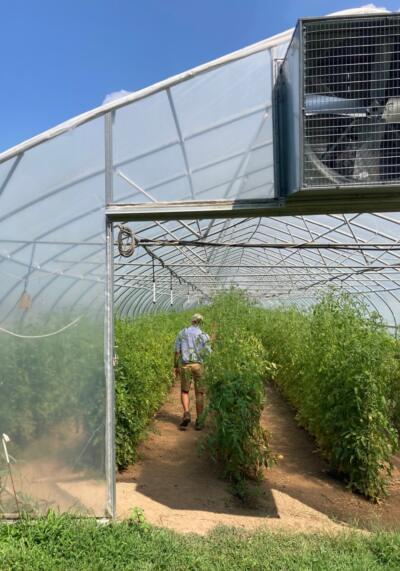
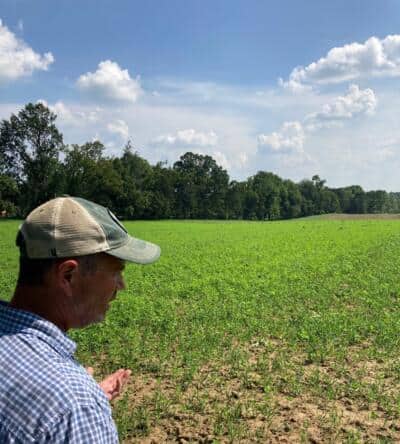
 For government funding, or appropriations, neither chamber has successfully passed all twelve of the necessary spending bills on the floor, which means much of the limited floor time for the rest of the year will be spent on both a continuing resolution and then hopefully passing full funding bills before the end of the year. But, that would mean the other expiring piece of legislation, the Farm Bill, would also need an extension. This is all-but guaranteed with the amount of work needed to bridge the yawning gap between the Senate and House spending bills. Some predict that the Farm Bill will be extended until the spring of 2024, some until after the elections in 2024.
For government funding, or appropriations, neither chamber has successfully passed all twelve of the necessary spending bills on the floor, which means much of the limited floor time for the rest of the year will be spent on both a continuing resolution and then hopefully passing full funding bills before the end of the year. But, that would mean the other expiring piece of legislation, the Farm Bill, would also need an extension. This is all-but guaranteed with the amount of work needed to bridge the yawning gap between the Senate and House spending bills. Some predict that the Farm Bill will be extended until the spring of 2024, some until after the elections in 2024.
